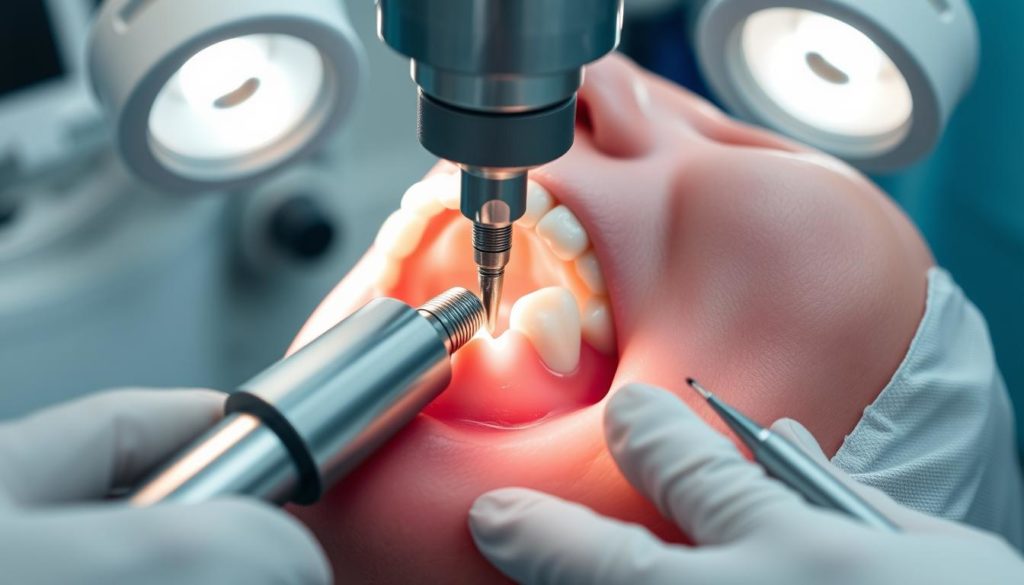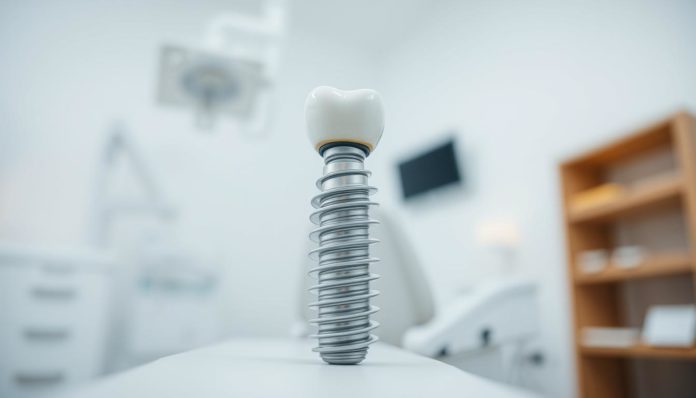Did you know that nearly 178 million Americans are missing at least one tooth? This shows the need for good tooth replacement options. Lost teeth from decay, injury, or disease can really lower someone’s confidence and affect daily life. Thanks to implant dentistry, there’s a cutting-edge way to bring back your smile’s look and function.
Dental implant benefits go way beyond just looking good. They match your natural teeth perfectly, lifting your confidence and oral health. By learning how dental implants can change your smile, you’ll see why they’re top choice for replacing teeth. Are you ready to learn more? Let’s dive into the benefits and how implant dentistry works.
What Are Dental Implants?
Dental implants offer a long-lasting solution for missing teeth. They replace natural tooth roots with strong, artificial ones. Made from materials like titanium, they blend with your jawbone. This helps keep your bone structure healthy and strong.

Definition and Overview
The main aim of a tooth implant procedure is to bring back your smile and tooth function. Implants form the core for crowns, bridges, and dentures. They look and feel like your own teeth. Plus, they help keep your jawbone healthy through osseointegration.
Types of Dental Implants
There are main types of dental implants to know about: endosseous implants and subperiosteal implants.
- Endosseous Implants: Root form implants that go into the jawbone. These are great for many people. After healing, they offer a firm base for new teeth.
- Subperiosteal Implants: Placed under the gum but on top of the jawbone. They are for those with less jawbone who cannot have bone surgery. This implant is made to fit just right under the gums.
Knowing the implant types helps you choose wisely for your needs. It ensures you get a tailor-made treatment plan.
The Benefits of Dental Implants
Dental implants are changing smiles everywhere every day. They offer benefits that do more than just fill gaps. Let’s look at the top reasons why dental implants are the best choice for replacing teeth.
Improved Aesthetics
Dental implants significantly enhance your look. They match perfectly with your own teeth, giving you a beautiful, natural smile. You can talk and smile confidently with friends or in photos, thanks to dental implants.

Enhanced Oral Health
Dental implants are key for keeping your jawbone healthy. Unlike other options, they go directly into the jawbone. This stops bone loss that can happen after losing teeth. It keeps your face shape and boosts your overall mouth health.
Increased Comfort
Implants are super comfortable. They feel just like part of your own mouth. You can enjoy comfortable chewing and easy talking. Eating your favorite foods becomes a joy, and you can speak clearly and with confidence.
| Benefit | Description |
|---|---|
| Natural-looking Teeth | Implants are made to look like your own teeth, making your smile better. |
| Jawbone Health | By stimulating the jawbone, implants stop bone loss, keeping it strong. |
| Comfortable Chewing | With implants, eating and talking become easy, providing stability and comfort. |
The Dental Implant Procedure
Dental implant procedures guarantee a permanent fix for missing teeth. They include an initial check-up, the surgery, bonding, and aftercare. These steps lead to long-lasting success.
Initial Consultation
First, patients have a consultation. The dentist checks oral health, takes X-rays, and plans the treatment. This ensures the implant will bond well and succeed.
Surgery and Healing Process
The surgery involves inserting a titanium post into the jaw. Then, the healing starts. The jaw and implant bond, creating a strong base for the new tooth.
Post-Procedure Care
After the implant, care is key to lasting success. This includes good oral hygiene and dentist visits to check healing. Following care advice, implants can last for many years.
Dental Implants vs. Other Tooth Replacement Options
Choosing the right tooth replacement option requires knowing the differences. This section looks at how dental implants compare to dental bridges, implant-supported dentures, and traditional dentures.
Dental Bridges
Dental bridges are chosen by many to replace missing teeth. They involve using crowns on the teeth next to the gap with a false tooth in the middle. However, this method means changing the healthy teeth next to the gap, an important factor in the bridge vs implant debate.
Dental implants, on the other hand, do not affect the teeth next to them. They combine with the jawbone, offering a look and functionality that’s more natural. For those considering bridge vs implant, implants are a lasting and minimal solution.
Implant-Supported Dentures
Implant-supported dentures offer a snug, comfy fit for those missing many teeth. Anchored by implants, they have better hold than traditional dentures. They are a top choice for people looking at a full arch replacement.
Implant-supported dentures need fewer implants for a full set of teeth, making them a smart pick for major tooth loss. The stability and bone loss reduction are key advantages of this tooth replacement option.
Traditional Dentures
Traditional dentures are a well-known tooth replacement. They’re made to fit one’s mouth but can slip and cause discomfort. While less costly upfront, they don’t offer the stability and bone benefits of implants.
For those thinking about a full arch replacement, traditional dentures may fall short because they rely just on gum support and adhesive. Dental implants, in contrast, provide a strong and enduring alternative for lasting oral health.
| Tooth Replacement Option | Pros | Cons |
|---|---|---|
| Dental Bridges | Quick procedure, more affordable than implants | Affects adjacent teeth, less durable |
| Implant-Supported Dentures | Stability, bone preservation, fewer implants needed | Higher initial cost, surgery required |
| Traditional Dentures | Affordable, non-invasive | Instability, discomfort, potential bone loss |
Cost of Dental Implants
Knowing the dental implant cost is key before deciding on it. This part will detail the factors that play into the cost. It also shows why it’s an investment in oral health.
Many things impact the total cost of dental implants:
- Number of implants needed
- Type and quality of the implant material
- Where the dental clinic is located
- How experienced the dental specialist is
The initial cost might look steep. Yet, the long-term gains are huge. Dental implants are a lasting fix, saving money on future dental visits. They are a smart investment in oral health.
For those worried about the dental implant cost, there are options:
- See if your insurance coverage includes any part of the procedure.
- Ask the dental clinic about payment plans or financing.
- Use Health Savings Accounts (HSAs) or Flexible Spending Accounts (FSAs) for medical expenses with tax benefits.
Making smart choices and knowing about insurance coverage and payment methods can help handle the cost of dental implants well.
Choosing the Right Dental Implant Specialist
Choosing the right dental implant specialist is crucial. The success of your procedure largely depends on it. Consider their qualifications, experience, and patient reviews when making your choice. These guidelines are designed to help you decide wisely:
Qualifications: Make sure the specialist has board certification. Board-certified oral surgeons have been through tough training and tests. Their certification shows they’re skilled and dedicated to high-quality care.
Experience: Choose a specialist with a lot of experience. Those with many successful procedures behind them tend to achieve better results. They usually know more about different implant methods and tools, too.
Patient Reviews: Patient reviews are very important. They give you real insight into the specialist’s abilities and how they treat their patients. Good reviews are a sign of a specialist’s strong reputation and quality care.
- Check online platforms for testimonials.
- Ask for references from friends or family.
- Consult with the specialist directly to get a feel for their approach and professionalism.
By looking at these aspects, you can confidently pick among the top dental implant specialists. This ensures your implant journey is successful and smooth.
Preparing for Dental Implant Surgery
Getting ready for dental implant surgery is key to a good outcome. It involves important steps and thoughts that help create a treatment plan just for you.
Pre-Surgery Consultation
Your first step is a detailed pre-surgery chat with your dentist. They’ll check your health, teeth, and bone strength. This is to make sure you’re ready for surgery and to plan where the implants will go.
This talk is also when you’ll learn about your treatment plan. Your dentist will explain how many implants you need, what kind they’ll use, and how long it will take. It gets you ready in both mind and body for what’s coming.
Factors to Consider
Many things can affect how well your dental implant surgery goes. Here are the main ones:
- Overall Health: Being healthy helps you heal better. Tell your dentist about any health problems you have.
- Bone Density: Your jawbone needs to be strong to hold the implants. You might need a bone graft to make it stronger.
- Lifestyle Habits: Not smoking, keeping your teeth clean, and watching your medicine intake can help the implants heal well.
- Mental Preparedness: Knowing what to expect helps you get ready mentally. Understanding the healing time and how to care for your implants can manage your expectations.
Taking these steps and getting a full exam before getting implants leads to a beautiful smile.
Aftercare Tips for Dental Implants
After you get dental implants, it’s very important to take care of them. A good aftercare routine helps your new smile last long and stay healthy. You need to keep your mouth clean, see your dentist often, and watch what you eat. Doing these things right will keep your dental implants in top shape.
Oral Hygiene Practices
Good oral hygiene is key to stop infections and keep your implants sturdy. Brush gently around the implant with a soft-bristled brush and non-abrasive toothpaste. Floss every day to take out food and plaque. Also, using an antimicrobial mouthwash helps protect even more.
Regular Check-ups
Going back to your dentist for follow-ups is super important for your implants. These visits let your dentist check on your implants and gums early on. They also let you get professional cleanings. These are essential for great oral health.
Dietary Recommendations
Following the right diet after your surgery helps a lot with healing. Start with soft foods to not strain your implants. As your dentist says, you can slowly add back firmer foods. Stay away from hard, crunchy, or sticky stuff that might hurt the implant area. Eating right makes sure your implants heal well and bond correctly.
FAQ
What exactly are dental implants?
Dental implants are a way to replace missing teeth permanently. They use titanium posts placed into the jawbone. These implants are the base for new teeth that look just like your natural ones.
What are the benefits of dental implants?
Dental implants improve your smile and keep your jawbone healthy. They’re more comfortable than other tooth replacement options. You’ll chew and speak better, boosting your confidence.
How is the dental implant procedure done?
The procedure starts with a consultation. Then, surgery is done to insert the implant into the jawbone. The healing takes a few months, allowing the implant to bond with the bone. Good oral hygiene and regular check-ups are important after.
How do dental implants compare to other tooth replacement options?
Implants are better than bridges and dentures. They don’t change surrounding teeth like bridges do. Implant-supported dentures are more stable and comfy than traditional dentures.
How much do dental implants cost?
Dental implants cost varies with the procedure complexity and location. They’re a long-term investment in your oral health. Some insurance and payment plans may help with the cost.
How do I choose the right dental implant specialist?
Choosing a qualified specialist is important. Look for someone with board certification and lots of experience. Reading reviews and consulting with the specialist will help you decide.
How should I prepare for dental implant surgery?
Prepare by reviewing your health and any medications with your specialist. Ensure you’re healthy and follow the treatment plan to get ready for surgery.
What aftercare is required for dental implants?
Good oral hygiene is key to caring for implants. Visit your dentist regularly to check the implants. Eating soft foods right after surgery also helps with healing.


